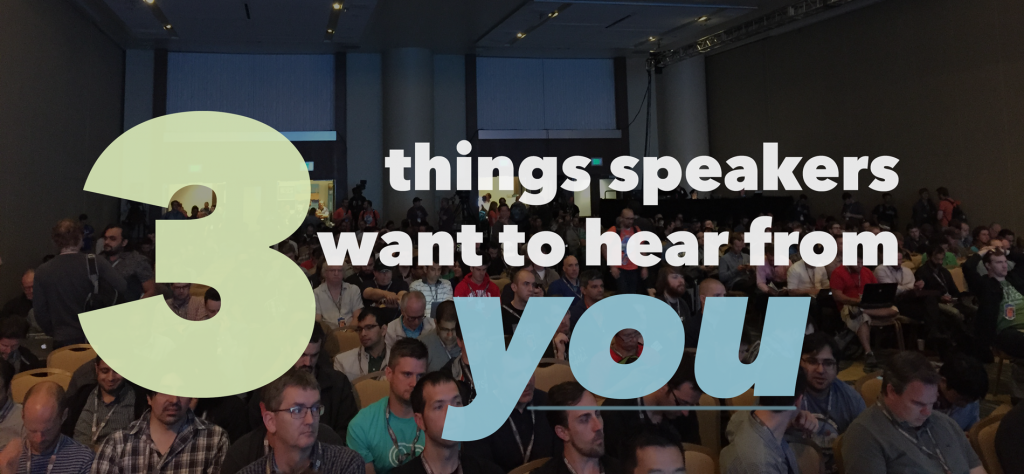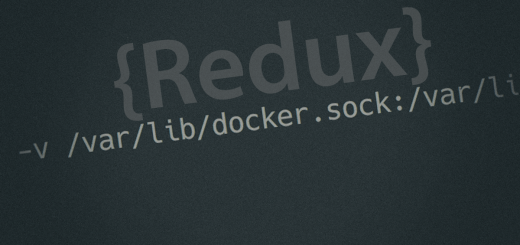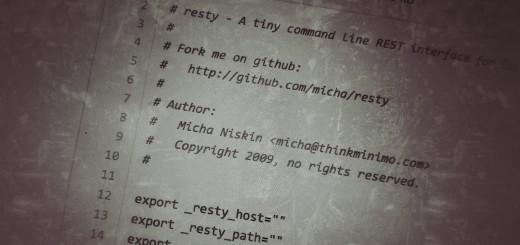3 Things Speakers Want to Hear From You

So you’re at yet another tech conference and dozens of speakers are giving talks throughout the week. Many of them seem unfazed by the fact they are speaking in front of anywhere from fifty to a few hundred, or even a few thousand, people! First of all, let’s deal with this misunderstanding about the mental state of conference speakers, even very seasoned ones, especially right before the talk begins. I asked for some feedback on Twitter this past week; check out these responses from @QuinnyPig, @shapr, and @Azumanga:
I thought that after 120+ conferences I'd not get knee-shakingly nervous right before I give a talk I know intimately.
I thought wrong.
— Corey Quinn (@QuinnyPig) March 28, 2018
I give fifteen minute lightning talks almost every week for the past 2.5 years, have consistently gotten great feedback and my coworkers love my talks, and I still get nervous, sometimes *extremely* nervous.
— SH∀∃ ∃RISSON ☠ (@shapr) March 28, 2018
Every time I speak I get nervous, which causes "intestinal upset". After 100s of lectures and 10s of talks, many of which I'm told were very good, I still always make sure I have "go to bathroom" time before I am due to speak.
— Chris Jefferson (@Azumanga) March 28, 2018
Anyway, I digress, but as your favorite conference speaker now breathes a sigh of relief as they finish their allotted few minutes of stage time, what do you think they want to hear as feedback? Many of them have spent many hours in painstaking preparation, and if they added live coding or demos to the talk, the anxiety level is even higher!
People really underestimate the amount of preparation that goes into talks, live demos, and keeping things fresh.
— Kelsey Hightower (@kelseyhightower) March 21, 2018
So, with some input from fellow speakers I’ve come up with three main responses that your average conference or meetup speaker wants to receive from you, the audience.
1. Your Talk Helped Me Learn About …
The majority of conference speakers are actually doing these talks as a labor of love to share knowledge and expertise that they have gained in a specific technology or concept. They would love to hear that it actually worked. What’s even cooler is that maybe you learned about something that wasn’t even the main intention of the talk. The speaker would probably love to hear that there were unintended positive side effects of the material they prepared. So, be specific. “Great talk!” is nice to hear, but hearing a full sentence about the fact we’ve demystified a specific concept or that you now understand technology X much better would be awesome to hear!
2. Ask useful questions during the Q&A
The Q&A time, contrary to popular thought (!!), is actually for the audience to ask questions, not for the audience to contribute their own ideas on the topic. It would be awesome if you asked insightful questions during this time that draws out the speaker more. Usually they are more relaxed during Q&A as the main portion of the talk is complete, and they can have some interaction with fellow technologists who may be on the same journey they have been on with the subject matter. Asking useful questions that are on-topic with the presentation shows the speaker that the audience was connecting with the material and want to dig deeper or get clarity on a particular point.
3. Thank You!
It’s a simple thing, but given what we know about the significant time investment of each speaker, and in many cases the courage to step onto the stage, it is awesome to hear “thank you” from conference attendees. Thankfulness can go a long way in helping a discouraged speaker–one who is well aware of their own mistakes and the part of the talk that didn’t go as planned–recover and realize that it was useful for them to step up and give the talk even with all the imperfections. All of us tend to be extremely hard on ourselves (ref: imposter syndrome) and sometimes it takes a sea of thank you’s to overcome the overly critical voice in our own head.
Never miss an opportunity to tell someone how much you appreciate them and exactly what they did to earn it.
— Kelsey Hightower (@kelseyhightower) March 28, 2018
In Closing…
A couple “don’ts” to close this post out:
- Unless you are a close friend of the speaker (or maybe the well-known expert on the topic they spoke about) now is probably not the time to give a laundry list of constructive criticism and feedback on the content. Most speakers have people available to them to provide the necessary critical feedback on content, approach, style, and so on. It will most likely not be easy to take that kind of feedback from a total stranger, so hold it for now. If you must share some corrections to content, knowing that most speakers want to present the correct information, I would suggest sending an email, Twitter DM, or a message via whatever contact method the speaker provided the audience.
- While a speaker may seem totally comfortable on stage speaking to hundreds or thousands, remember that people are human, and weariness of crowds, social interactions, and so on may mean that the speaker would strongly prefer not to hang around and talk with you for the next hour! Give a speaker space to do whatever is best for them to “recover” from conference and/or speaker overload. Ask them politely for some time if you really want to discuss the topic further, but understand they may not be up for it today. If so, find another contact method, and take it graciously and back off if you are politely told no. All the usual code of conduct guidelines are in effect with speakers just as much as they are with other conference participants!
It would be cool if conferences planned for actual hiding spots. Not obvious ones but just little areas, I usually find them regardless.
— jessie frazelle (@jessfraz) October 18, 2017
And thanks to Kelsey Hightower, the cloud native quintessential speaker, for some perfectly timed tweets this past week without even knowing I was writing up this post! Go out and thank a speaker today. It could make their day.
P.S. And if you think speakers don’t have a load of “#fail” stories, check out this post and related tweet thread on the topic of speaker fails. Thanks to Vuong Pham for pointing it out to me on Twitter!




Recent Comments